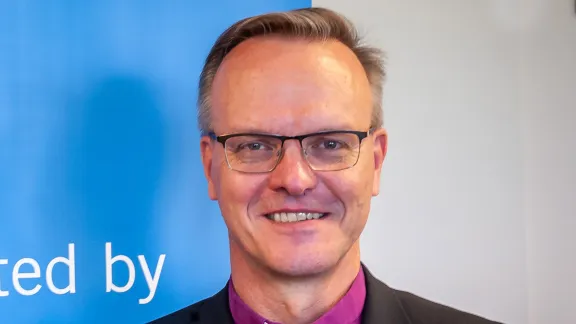
Finnish Archbishop Tapio Luoma . Photo: LWF/ S. Gallay
Voices of the communion: Tapio Luoma, Evangelical Lutheran Church of Finland
(LWI) - Tapio Luoma was elected Archbishop of the Evangelical Lutheran Church in Finland (ELCF) one year ago. In an interview he speaks about his churches’ work with refugees and migrants, dealing with populism, and staying relevant in a changing society.
In August, your church with others issued a paper speaking publicly about the rights of asylum seekers. Can you explain this initiative, how it came to be, and what you hope to achieve?
Leaders of all the member churches of the Finnish Ecumenical Council issued this paper. We’re hearing the concern of many parishes about the safety and religious freedom of deported asylum seekers. Two issues stand out. First, some asylum seekers who receive a negative decision are being returned to areas that cannot be considered safe. This includes people who have converted to Christianity and face a risk of persecution. Second, there’s the issue of assessing whether religious conversion is genuine or asylum-motivated. We are worried that the authorities tasked to do this lack expertise in religion and culture. Also, we think statements made by an applicant’s parish are not always given the weight they deserve.
How does your church address migration?
Our parishes are actively responding to the needs of migrants and asylum seekers, offering psycho-social support and practical help. As a church, we’re participating in public discussion about migration and values. The key is respect for everyone’s human dignity and human rights. At the same time, we maintain a positive and open dialogue with the immigration authorities. We support them in their important task of ensuring that everyone who needs protection receives it.
Finland, like many European countries, has a large populist movement. How do you as a church position yourself?
This is a challenge that needs serious attention. How do we address those people in our society who feel neglected by those they call “the elite”? Many such people are loyal members of our church. We should take their sense of exclusion seriously and continue our work among poor and marginalised people in our society – so they can see for themselves that helping the stranger is not taking anything away from those who were born in Finland.
You have been Archbishop for one year now. What stands out from that time?
The speed of change in our society is increasing, and I feel that traditional institutions, including our church, are struggling to keep pace. So there’s also often a sense of pressure and hurry in my work. On the other hand, I very much enjoy this unique opportunity to serve my church.
Where do you see the gifts of your church?
In its members. Although our parishes are facing economic challenges, there is also great potential to encourage volunteers. Our confirmation school reaches more than 80 percent of young 15-year-olds. The Evangelical Lutheran Church remains a key element in Finnish society, and recent surveys show that people’s trust in us has not diminished. And it’s not only the Finnish members of the body of Christ who make a difference. Christians are a global communion, and every member of this communion is a priceless gift to all of us. That’s why ecumenical relations are so precious.
What are some of the key issues the church is facing?
Declining membership calls for sound analysis and innovation. Society as a whole is becoming more individualistic, and long-term commitment is waning. We need new ways to address people and become relevant to their life.
We need new ways to address people and become relevant to their life.
A tightening economy means parishes need to get their priorities right. What is key to our work? What can we do in partnership with others? Are there areas in our current work that we might safely leave to others?
I think the core question in every case is how we can keep Christian faith relevant for this age and testify to the risen Lord in a rapidly changing environment.
The Finnish church has launched the Forgivemoji-initiative. What would your emoji look like, and to whom would you send it?
I’m not that good at graphics, so I’m happy to wait for other people’s ideas. I hope there’ll be many. I think it’s a very worthwhile initiative to encourage people to forgive each other. I look forward to having a special emoji for this, and I will try to put it to good use!
The Lutheran World Federation is a global body that shares the work and love of Christ in the world. In this series, we profile church leaders and staff as they discuss topical issues and set out ideas for building peace and justice in the world, ensuring the churches and communion grow in witness and strength.


